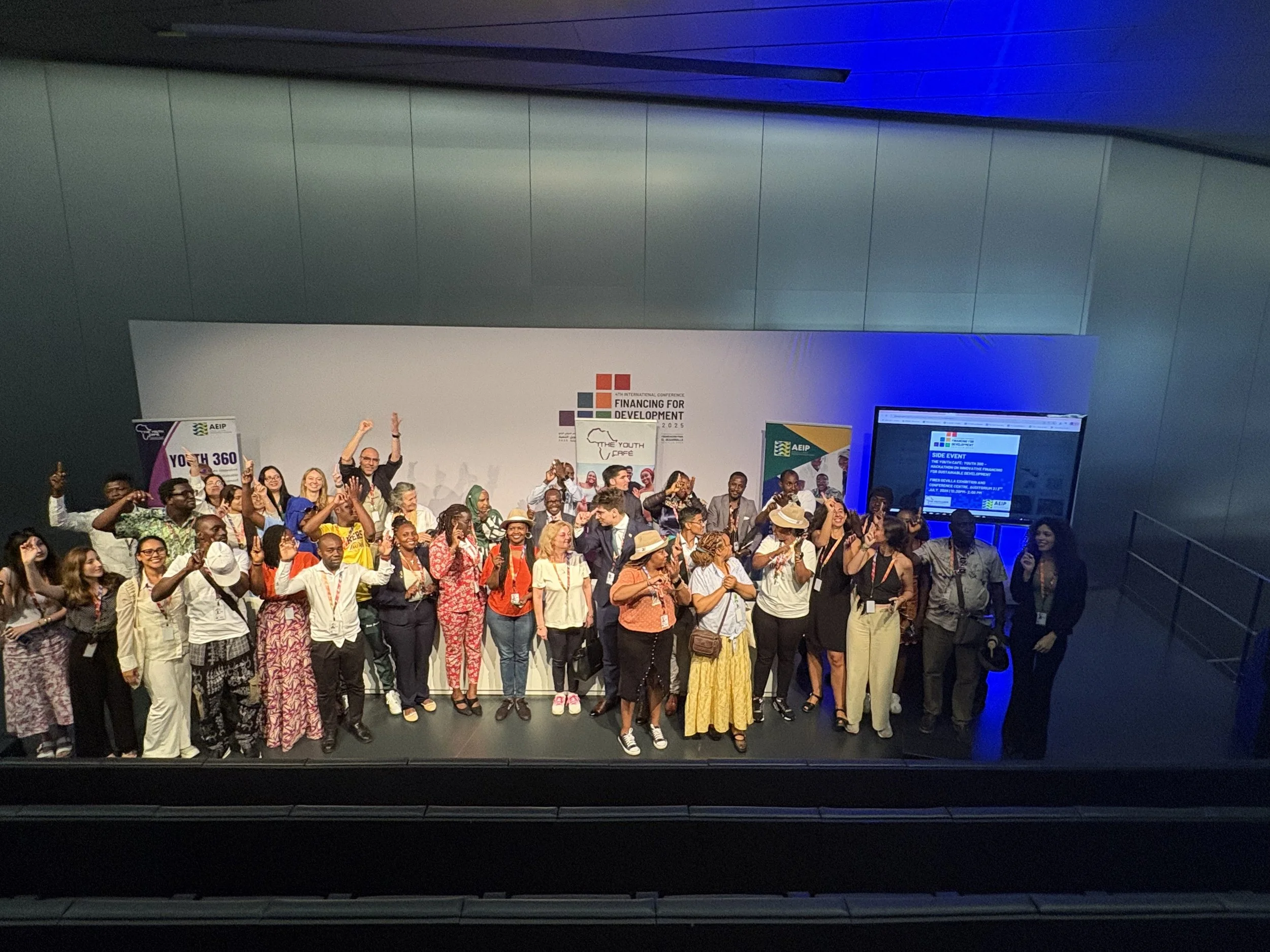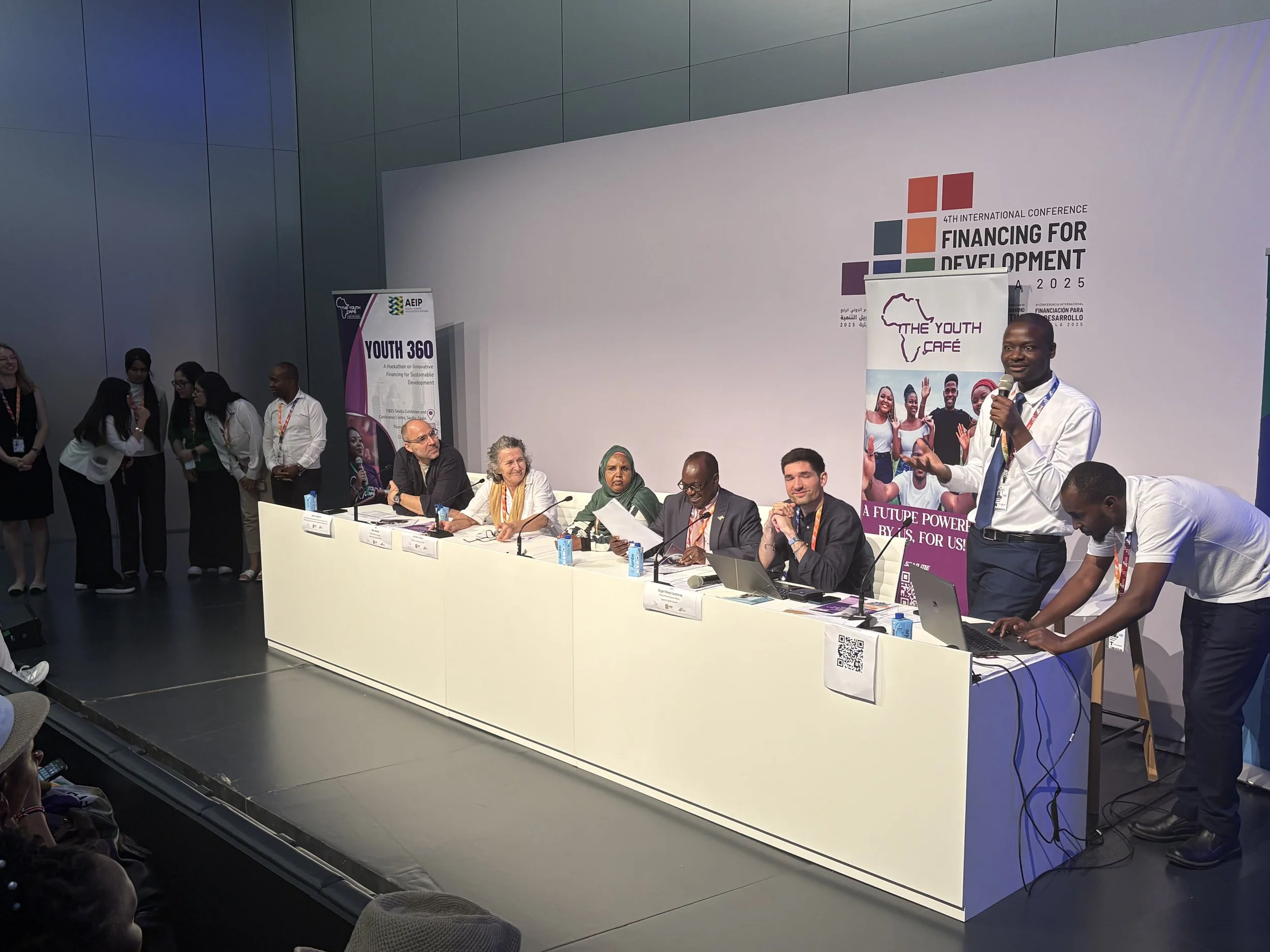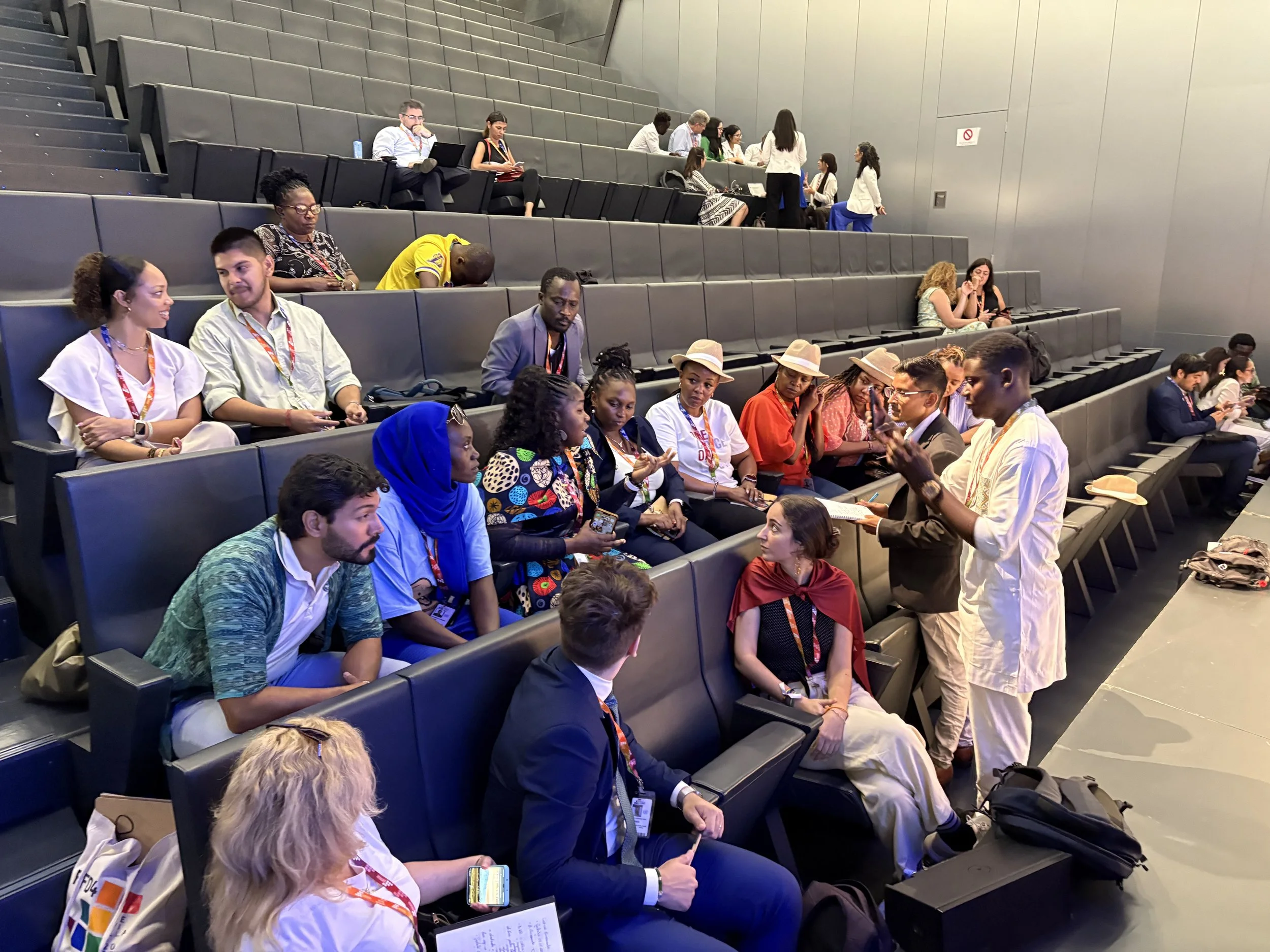Hackathon participants pose for a group photo.
As the world gathered in Seville for the Fourth International Conference on Financing for Development (FfD4) from 30 June to 3 July 2025, a vibrant youth-driven side event also took place alongside the conference proceedings; the Youth 360 ~ Hackathon on Innovative Financing for Sustainable Development.
The Youth 360 Hackathon, hosted at the FIBES Sevilla Conference Centre, brought together over 60 participants from Africa, Europe, and beyond. Organised by The Youth Café and supported by the Africa-Europe Innovation Platform (AEIP), this high-energy event served as a unique convergence of youth-led organisations, development agencies, and innovation hubs. The hackathon exemplified AEIP’s mission to bridge continents by fostering Pan-African and European collaboration.
The energy in the room was palpable as youth leaders, policy influencers, technologists, and finance experts gathered to co-design real-world financing solutions and to tackle one of the most pressing global challenges: how to finance a just, inclusive, and sustainable future to address urgent development challenges. This event fostered youth involvement in innovation and entrepreneurship, further aligning with AEIP’s focus on capacity building for citizen involvement.
Some of the participating organisations in the in-person Hackathon included French Development Agency, All-Africa Students Union (AASU), Children and Youth International, AIESEC, UNOPS, Spanish Youth Council, Teach the Future, Lowy Institute, Climate Bonds Initiative, Alliance for Development, Development Gateway, Government of the State of San Luis, Mexico, among others.
At the FfD4, The Youth Café advanced the positions of civil society in science, technology and innovation by joining over 1000 members of civil society organisations (CSOs), trade unions, movements and networks from around the world, actively engaging in and contributing to the Financing for Development (FfD) process since its inception, and participated in a Civil Society Forum ahead of the conference.
With a declaration which is both a reaction to the FfD4 Outcome Document – “Compromiso de Sevilla” – and a political statement reflecting the shared recommendations we want to convey to UN Member States and the international community. This includes the urgent and systemic challenges in global governance today: the deepening democratic deficit in the governance of science, technology, and innovation (STI). At a time when societies are grappling with the transformative impacts of digital and frontier technologies — including artificial intelligence — the outcome document adopts a narrow, technocratic approach.
The Judging panel.
Bold ideas from young minds
The hackathon kicked off with symbolic energisers and powerful opening remarks from Willice Onyango, Executive Director of The Youth Café. He launched three youth-authored policy briefs that underscored Africa’s financing gaps and opportunities — on climate finance, debt justice, and youth capacity-building in science and technology.
What followed was a design-thinking hackathon sprint across four thematic areas aligned with the FfD agenda:
Climate finance
Digital tools & domestic resource mobilisation
Youth engagement in local government finance, budgeting, inclusive financing for marginalised youth, debt and debt sustainability
Innovative financing, access to private finance and capital for young entrepreneurs
These thematic areas were specifically chosen to align with the needs identified for capacity building for citizen involvement while the post-hackathon mentoring and incubation of the resultant innovative ideas aligns with AEIP’s objective of equipping participants with essential skills and knowledge related to entrepreneurship and innovation market dynamics.
Participants formed interdisciplinary teams and spent 40 minutes in the afternoon ideating and co-creating practical financing innovations. Thereafter, with a spirit of creativity and innovation, the event’s pitch session occurred featuring a diverse and dynamic jury, including: Ángel Pérez Contreras, the Head of International Affairs from the Spanish Youth Council, Eliza Herald, a Whole-Systems Strategist from WaterUnity Networks (WUN), José M. Ruibérriz, the Director of Social Economy and Innovation, Asamblea de Cooperación por la Paz (ACPP), and a board member, the Andalusian Consortium for Social Impact (CAIS), Balkhisa Bashir, an Executive Director of Barwaqa Relief Organisation and Charles Ombui Mogaru Mongina, an Executive Director of The Family Organisation for Empowerment (FOREM).
Among the actionable solutions generated from the Hackathon pitches were:
Climate Youth Bond & Coalition: A dual mechanism proposed to aggregate youth-led climate projects and raise capital via internationally listed bonds, potentially hosted by IFAD or similar institutions.
AI-Powered Financing Tool: An open-source digital platform to integrate remittances, taxes, and investment flows, addressing fragmentation in domestic financing across developing nations.
Civic-Tech & Budgeting Inclusion platforms: A solution advocating youth advisory roles in local finance and debt sustainability, complete with civic-tech platforms and mentoring pipelines.
Matching Investment App for young entrepreneurs and private investors: A fintech prototype to bridge the gap between young entrepreneurs and private investors through trust-building, transparency, and co-creation.
A cross section of Hackathon participants.
From the jury of experts
The Climate Youth Bond team stood out and was declared the winner, signalling a fresh wave of climate finance thinking led by African youth. Followed by second runners-up, the AI-Powered Tool team and the Civic-Tech Youth Engagement group became the third runners-up.
The jury’s feedback emphasised the importance of simplifying complexity in financing systems, ensuring inclusivity, and testing AI prototypes in real-world conditions while having feedback loops for improvement of the AI-powered financing tool and the financing models adopted.
Special thanks to our incredible jury, facilitators, and global youth partners. The success of this Hackathon and its TYC~AEIP collaborative direction of providing innovators with knowledge, tools for collective action, and fostering networking among stakeholders is indeed attributed to you.
Beyond the Hackathon: what’s next?
The Youth Café reaffirmed its commitment to supporting youth-led ideas beyond the hackathon through:
Mentoring and prototyping support
Six-month implementation guidance
Strategic linkages with funding bodies and multilateral partners
Post-event knowledge sharing to influence FfD4 policy outcomes
A comprehensive report will be released soon, outlining detailed solutions, jury feedback, and youth commitments to continue shaping the financing for development agenda.
These post-hackathon initiatives are integral to TYC’s role in showcasing and supporting promising initiatives through the annual Africa innovation challenges and providing avenues for networking, potentially culminating in a Youth Entrepreneurship Summit where winning entries could be awarded.
We see direct synergies between the outcomes of this Hackathon and the development of a playbook co-developed by youths on particular topics of interest and concern as would emerge from further refinement and testing of these solutions. The concept note co-creation and further implementations of these ideas presents an opportunity to practically test these solutions and feed them into the Art4Change storytelling Fellowship programme out of the inspiring innovative solutions stories on resultant youth employment opportunities.
This hackathon didn’t just spotlight innovative youth ideas, it challenged the status quo. It reaffirmed that young people are not merely beneficiaries but architects of the financing models of tomorrow. As one participant boldly declared, “There’s enough money in the world — it’s just not going to the right places.”
The Youth Café and Africa-Europe Innovation Platform have led the way. To our other partners, funding bodies, governments, and the global development community, the solutions are here and with the youths too! The energy is here. The future is already being built by youth. Let’s ensure we fund, implement, and scale these ideas.
Note: Please stay tuned for the full report and how YOU can support or get involved. Photos from the event, presentation slides, and policy briefs will be available on www.theyouthcafe.org shortly.
Learn more and stay tuned about the AU-EU Innovation Platform by subscribing to our newsletter.
For any further enquiries or collaboration opportunities, please contact: Info@theyouthcafe.com




